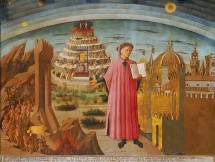Dante
Divina Commedia
(by Dante Alighieri 1/6/1265 – 14/9/1321) (completed 1320)
[Note: extracts are from, and reference is to, the John Ciardi translation]
The greatest epic poem of all time (and we can say this with confidence, despite the dodgy standard of TVC’s latin).
It has a brilliantly (classically) simple structure – Recounting, in terza rima, how Dante spends the 1300 Easter vacation on a salvational tour of the worlds of our minds (and souls), guided through Hell and Purgatory by his poetic mentor, Virgil and accompanied by his poster-girl, Beatrice, in Paradise. There they meet Dante’s fiamma benedetta a flame of heavenly wisdom, S. Thomas Aquinas. S. Thomas was a formidable thinker but no great writer. Dante, taking hold of the 13th C theologian, supplied the art. “it is the flame, eternally elated, of Siger, who along the Street of Straws syllogized truths for which he would be hated.” (Pa. X) But he did something more: he created a new universe. And it was a universe that left Aquinas and Augustine, the best of the ancient Christians, pounding in the wake of something strange and monolithically modern. As Harold Bloom said with his usual wisdom in The Western Canon, “The Comedy…destroys the distinction between sacred and secular writing.”
Continue Reading →

